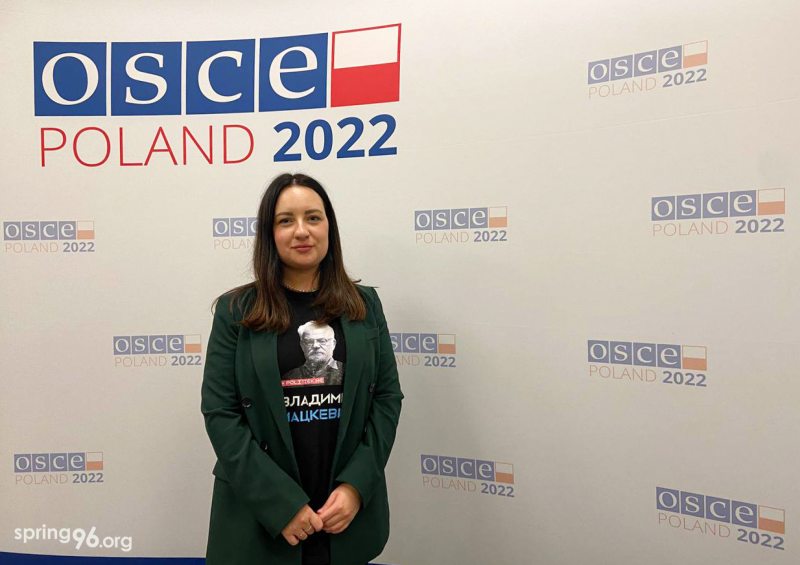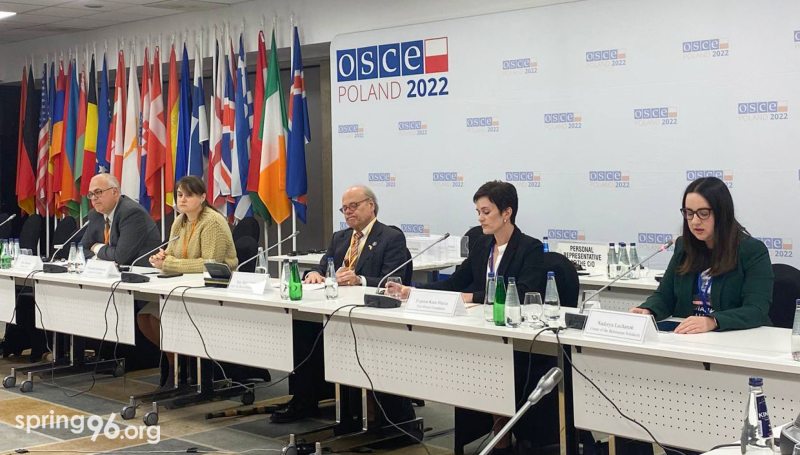Nadzeya Luchanok at the OSCE conference: “Our main goal is the release of all political prisoners”
Political prisoners in Belarus have been a topic of a side event at the OSCE Warsaw Human Dimension Conference, the largest European conference on human rights and democracy. The representative of the Belarusian Solidarity Center and political prisoner Uladzimir Matskevich’s daughter Nadzeya Luchanok was among the speakers at the plenary session “Putin and Lukashenka's prisoners: political prisoners in Russia, Belarus, and the OSCE region.”

- Member of Belarusian Solidarity Center Nadzeya Luchanok presented the case of her father philosopher Uladzimir Matskevich at Warsaw Human Dimension Conference 2022.
The daughter of a political prisoner said that repression continued in Belarus.
“Bloggers, businessmen, presidential campaign members and peaceful protesters are held in prisons only because they were not afraid to exercise their rights - the right to participate in peaceful assemblies, to express their opinion and to be involved in political activities. All segments of the population are repressed: from active participants to those who simply commented and liked posts on social networks,” noted Luchanok.
There are more than one million political prisoners worldwide. In Belarus with a population of 9.5 million people, more than 1,300 people are imprisoned for political reasons. Congressman Steve Cohen, the newly named OSCE PA Special Representative on Political Prisoners and Cochair of the U.S. Helsinki Commission, stressed that the worst thing that could happen in the situation of political prisoners was to forget about them.
Director of European and Eurasian programs of the international human rights organization Freedom House Mark Behrendt also noted that the big problem was precisely the silence through which political prisoners are forgotten. Evgenia Kara-Murza told about the prosecution of her husband, political prisoner and member of the Russian Anti-War Committee Vladimir Kara-Murza and other political prisoners in Russia. Nadzeya Luchanok shared the story of the persecution of her father:
“The figure of Uladzimir Matskevich is a symbol of modern intellectual and independent Belarus. Back in the 90s, he began to “think Belarus” as a self-sufficient prosperous state. In recent years, he has become one of the staunchest defenders of the country's sovereignty.
He was one of the first to draw public attention to the risk of Belarus losing its independence. In 2019, he initiated the Fresh Wind public campaign against the deeper integration of Belarus with the Russian Federation. He identified the absorption of Belarus by Russia and the introduction of amendments to the Constitution as two main dangers for Belarus in the next decade.
He has repeatedly written open letters to president Lukashenka, ministers Shunevich and Makei. In 2020 and 2021, he has publicly written and spoken daily offering analysis of political and social topics, as well as criticism and suggestions to active citizens and political leaders.
On August 4, 2021, he was arrested and held for more than six months in jail without charges. In February 2022, he held a dry hunger strike demanding that his case goes to trial. In June 2022, he was sentenced to 5 years of a reinforced regime prison camp for ‘gross violation of public order’, ‘leadership of an extremist formation’, and ‘insulting Lukashenka’, (but in reality he was imprisoned for dissent, the Orwellian ‘thought crimes’.
He continues to work and write in prison. Already two books have been written, but we are afraid that these texts may be seized by authorities and lost to the outside world.”

- The side event at the Warsaw Human Dimension Conference aims to highlight the growing crisis of political imprisonment in Russia and Belarus, and look at the trendlines throughout the OSCE region.
Luchanok presented at the Conference the demand of Belarusian society regarding the release of political prisoners:
“The topic of political prisoners cannot be considered outside of political discourse. Political prisoners in Belarus are the only remaining resistance. We can call them prisoners of war.
Of course, our main goal is the release of all political prisoners. But now it is important to find solutions to a number of short-term and intermediate goals. There must be a coordinated external pressure on the ruling regime, clear position and demands to the authorities.
People need to be released. But the regime will not release all people at once. It could be a long process like it was in 2011-2014. This is why it is important to begin the process by releasing at least some significant number of politically imprisoned. Even if not all. Here I speak on behalf of the relatives of the political prisoners.
We have enough will and reason to free the prisoners of conscience. We still need to build a new Belarus, a future democracy.”
From September 26 to October 7, the annual OSCE Conference on the Human Dimension takes place in Warsaw. It is attended by delegations from 57 OSCE countries, its structures and partners, civil society, and international organizations, including Belarusians.

















